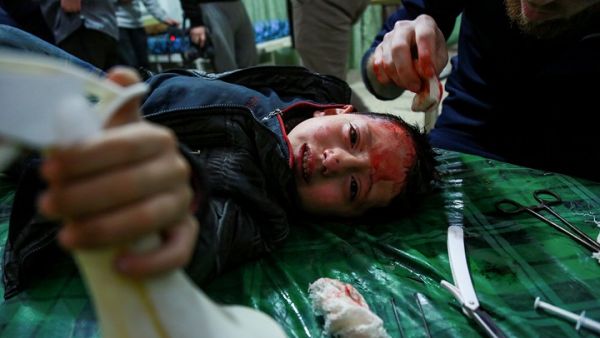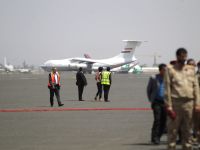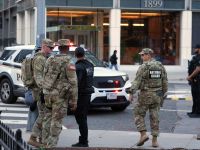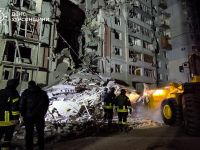- Assad has started a ground offensive in Eastern Ghouta
- Meanwhile nearby, ISIS controls parts of southern Damascus
- Assad is virtually ignoring ISIS while focusing on the siege of Eastern Ghouta
- Press coverage of Assad's fight to re-take Syria rarely mention his negligence of ISIS near Damascus
Eastern Ghouta in Syria has been described by the U.N. Secretary-General António Guterres as “Hell on Earth,” thanks to the Syrian regime’s relentless bombardment of the region and blockade on aid from accessing the city.
The regime has now begun a ground offensive on opposition forces in Eastern Ghouta, and the Britain-based Syrian Observatory for Human Rights reported that the Syrian government has already re-captured at least ten percent of the region.
Just a few kilometers southwest, ISIS maintains a tight grip over parts of southern Damascus’ suburbs. Assad has, as of the date of publication, made no attempt to oust ISIS from the areas around his own capital city while he dedicates much of his army’s resources to taking Eastern Ghouta.
The Ground Assault of Eastern Ghouta
Map showing assault on Eastern Ghouta and ISIS territory near Damascus (Rami Khoury/Al Bawaba)
Eastern Ghouta, home to approximately 400,000 Syrians, has been consistently besieged since 2013. Despite being marked as a ‘de-escalation’ zone to allow humanitarian access, civilians inside the region have been consistently exposed to barrel bombs, gas attacks and now ground offensives by the Syrian regime backed by Russian airpower.
Leading up to the ground assault, Assad accelerated bombardment of the region, killing over 100 civilians a day on average for nearly a week. This prompted the U.N. Security Council to unanimously pass a resolution establishing a 30-day ceasefire in Syria. The ceasefire never materialized on the ground as airstrikes pounded positions in the hours and days after the resolution passed.
Towns within Eastern Ghouta have been so thoroughly leveled that residents report that they are running out of places to hide to escape the carnage.
The Syrian regime and its allies considers the rebels groups that have controlled Eastern Ghouta to be terrorists, but is letting ISIS govern the lives of hundreds of thousands of civilians uncontested.
To add to the irony, ISIS Hunters have reportedly been sent to Eastern Ghouta to provide further specialized support for the ground offensive. ISIS Hunters is a group co-commanded by and comprised of Syrian and Russian forces and mercenaries. ISIS appears to have no presence in Eastern Ghouta.
ISIS is not Assad’s Priority

ISIS Propaganda depicting the execution of a man near Damascus
About 8 kilometers west of Eastern Ghouta and a 20 minute drive from Damascus’ city center lies ISIS territory.
The group, which governments around the world declared victory over months ago, controls the town Al-Hajar Al-Aswad and much of the Yarmouk Camp, a Palestinian refugee camp. Together, they have a population of over 200,000 according to the latest available consensuses.
Their presence near Damascus has received virtually no attention from the press, and has been ignored in coverage regarding the regime’s offensive on Eastern Ghouta. The regime letting ISIS stay near Damascus while relentlessly bombing Eastern Ghouta puts the developments around Eastern Ghouta in a new context.
- The Syrian Ceasefire Immediately Failed, Exposing a Broken United Nations
- With ISIS on the Run, One Affiliate Remains Strong in Syria
In early 2016, it was reported that IS would withdraw from both Al-Hajar Al-Aswad and the Yarmouk Camp, though that withdrawal never happened. In mid-February of this year, ISIS’ propaganda network Amaq reported that the group had captured an area of Yarmouk Camp from Hayat Tahrir al-Sham (HTS).
ISIS, universally considered to be a terrorist organization, appears to have uncontested control over much of the area it governs near Damascus, even though Syrian-state media reports that its operation to defend Afrin in northern Syria from Turkish forces is also meant to clear out ISIS fighters. This is despite the fact that ISIS is not in Afrin.
The contrast between relentless bombing of Ghouta and deliberate neglect of ISIS is becoming even starker: The U.N. aid convoy scheduled to reach the embattled city of Douma in Eastern Ghouta on Sunday, Feb. 4 has not departed, likely because of the ground offensive.
In practical terms for Syrians on the ground, this means that the 400,000 residents of Eastern Ghouta are trapped without aid or any discernible international support, while hundreds of thousands more in southern Damascus are trapped by ISIS.







